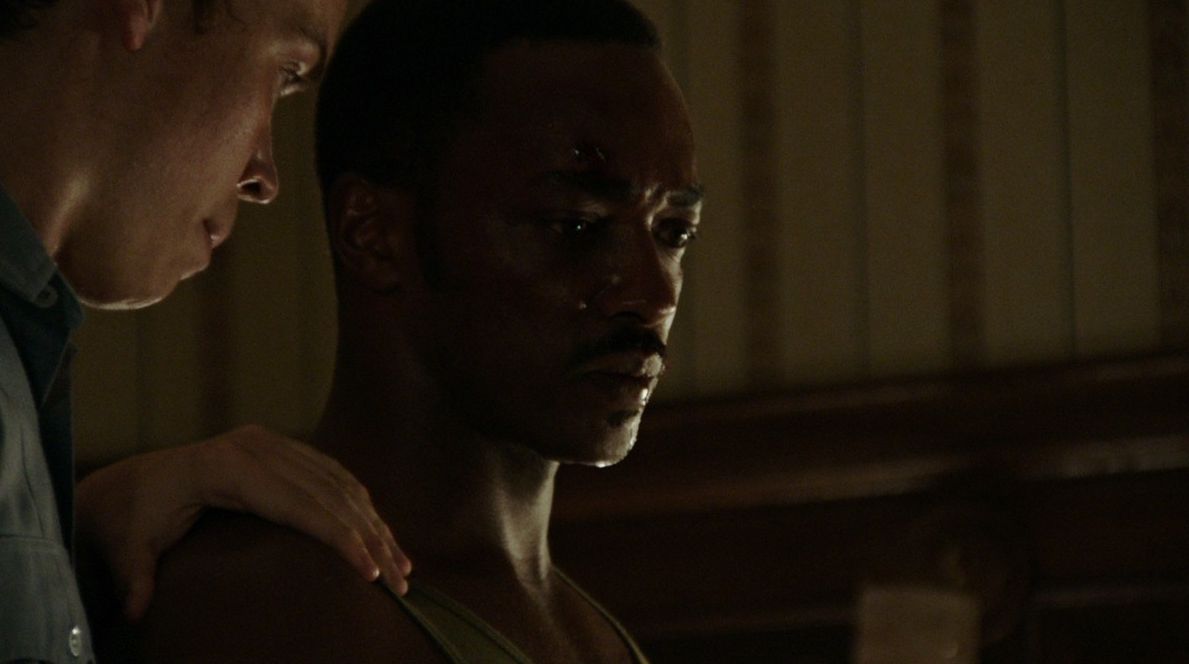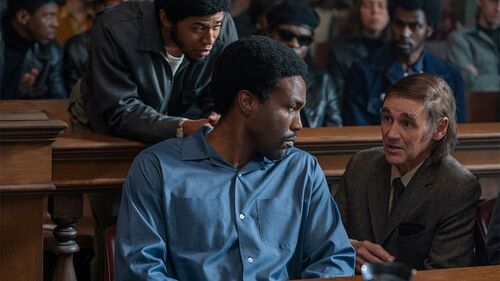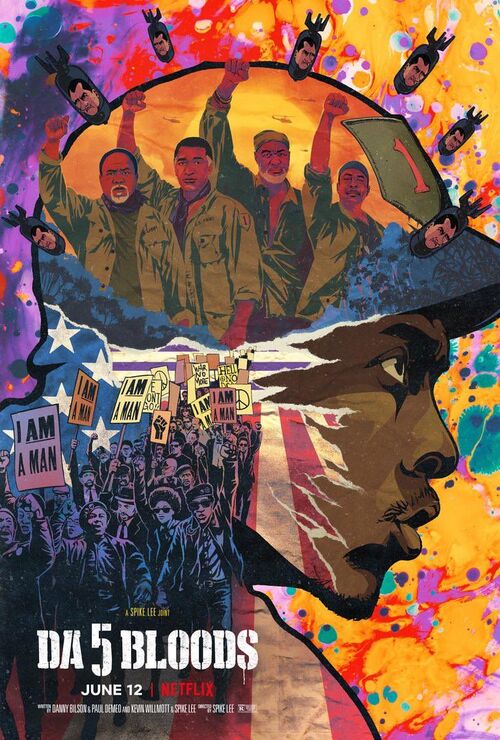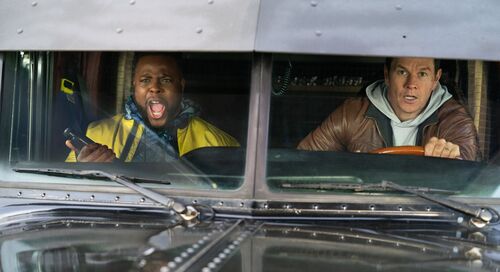
Detroit
 There are some parallels between Jordan Peele’s dark comedy Get Out and Katherine Bigelow’s Detroit. At the centre of the latter, a film set in the heat of the 1967 Detroit riots and uprising, is the incendiary matter of race relations, made even more so by the portrayals of vicious police brutality and at its strongest points, Bigelow harnesses absolute terror out of the mundane, much like in Get Out, only through an obviously more serious and frightening lens than in Peele's enjoyable film.
There are some parallels between Jordan Peele’s dark comedy Get Out and Katherine Bigelow’s Detroit. At the centre of the latter, a film set in the heat of the 1967 Detroit riots and uprising, is the incendiary matter of race relations, made even more so by the portrayals of vicious police brutality and at its strongest points, Bigelow harnesses absolute terror out of the mundane, much like in Get Out, only through an obviously more serious and frightening lens than in Peele's enjoyable film.
Like James Baldwin in I am not your Negro, Detroit doesn't shy away from calling white people monsters and soulless bogey men. That’s the kind of urgency Detroit reaches at its harrowing best, despite wavering at times. Screen writer, Mark Boal, has his roots in journalism and much like his script for Bigelow’s Zero Dark Thirty, hints of that nonchalance towards the subject of torture surface and it is easy to see why it would rub some people the wrong way. Then there’s the overarching controversy overarching this film that I won’t get into.
That said, Detroit is a damn good. So powerful, so haunting. It made me angry. The sparse screening I was in had this one girl yelling expletives at white people on screen in parts of the film. A cinema code violation, yes, but such is the empathy Detroit elicits I could not fault her. It truly is a world of blood and fire for African Americans in that city, and indeed America as a whole. The city resembles a war zone during this unrest and Bigelow, in the early moments of the film takes time capture the sheer scale of the destruction brought on by a section of the population that said enough was enough, before proceeding to its crux in the Algiers Motel – a name that will evoke a hellish chasm for some.
This nightmare begins when a police patrol team descends on the Algiers Motel, after three days of unrest, searching for a suspected “sniper”. When they fail to find him, the guests, all black males save for two white girls, are at the epicentre of an explosion from a bomb that began ticking centuries before. The film gives some context to the 1967 uprising in an animated reel that chronicles the assembling of this dirty bomb down to a police raid on a bar operating without a liquor licence. This is to be the last straw sparking the unrest that leaves us with a city hungover on fiery Molotov cocktails and under a vice grip of militarized enforcement.
In the midst of the chaos, we meet some of the major players before they make their way to the Algiers Motel. A truly terrific Will Poulter is the poster boy for dysfunction and broken systems as the violent patrol officer Krauss. Within the first few moments of meeting him, he is shooting a fleeing looter in the back. We come to realise the full extent of his sadism when her rounds up the black men in the motel. I kind of grew up with Poulter, taking in the childhood charm in Son of Rambow to his insufferable insolence in Voyage of the Dawn Treader. He cuts a menacing and physically imposing figure in Maze Runner and levels up under Bigelow’s stewardship here, letting loose a callous sadism simmering behind the Son of Rambow cuteness.
On the other side of the spectrum is the film’s standout, Algee Smith's Larry, the lead singer in a Motown soul group called The Dramatics. He is a victim for most of the film, starting from the moment a show is evacuated because of the riots right before his group is set to perform. It was to be their big break. In one of the best and most heart breaking scenes of 2017, Larry takes to the stage and sings before an empty auditorium evoking a portrait of broken dreams and reminding us that the status quo punishes both body and spirit. Later on, in search of refuge, Larry finds himself at the Algiers Motel to partake in the final moments of the calm before the storm.
In between the two sides, almost like an audience surrogate is a brilliant John Boyega playing a straight arrow security guard, Melvin Dismukes. He is protecting some stores from looters and doesn’t find himself at the wrong end of jackboots and batons because of his status. But he does seem compromised and there’s a touch of the xala about him, a certain helplessness that mirrors audience sentiments. Like us, he will get front row seats for the horrors in the Algiers Motel. Like us, there is nothing he can do but watch and brood. The film narrows in on his eyes and they look lost as he embodies the less is more ethos from a physical standpoint.
There is no less is more when it comes to the hellish ordeal in the motel, which has been described as torture porn by some. It’s a testament to the screenwriting rigour by Boal and the unflinching intensity Bigelow brings to recreating, almost in real-time, sequences that begin with the police and troops opening fire on the motel to the intense interrogation that sometimes borders on twisted farce. After sitting back detached from the early rioting we are meant to endure this section of the film with the victims. Close-ups from handheld genius Barry Ackroyd’s camera wring the vulnerability, pain and fear and it transfixes us and sears into our soul.
The brutality that ensues in the Algiers Motel assumes a certain timeless quality. The more blood we see scored to grunts of pain and intense breathing and shivers, the less dated the gruelling experience comes across. Full credit to the way Bigelow stages it; as claustrophobic and inhibited as possible, accentuating the chilling real life qualities that could be inserted into any film about the horrors of racism and police brutality. When the film finally gives us a breather, via some court room drama with a disheartening coda all too familiar in the final act, a scene with Boyega’s security guard puking encapsulates how sickening the situation was and is for black people in America.
Because of how visceral and brutal this film gets, totally arresting the audience, I think there are times Bigelow gets complacent and sloppy in subtle moments that compromise the urgency of this film. A moment in this film has a victim of the harrowing police brutality scamper through dark alley ways fearing for his life. He runs into another police patrol and police are stupefied. Who would do such a thing, an officer asks. My eyes rolled into the back of my head at this naïve beat this film could have done without.
I suppose the gut punch in this story is how much truth is a causality of the ordeal of black people in America. It is, for this reason, a film like Detroit is important, controversies considered. It’s a story that needed to be told, if for nothing at all, just so we know what happened at the Algiers Motel. You need to know this happened, Bigelow tells us. You also need to know people tried to bury it she seems to add, rightfully justifying her ferocious approach.
-


